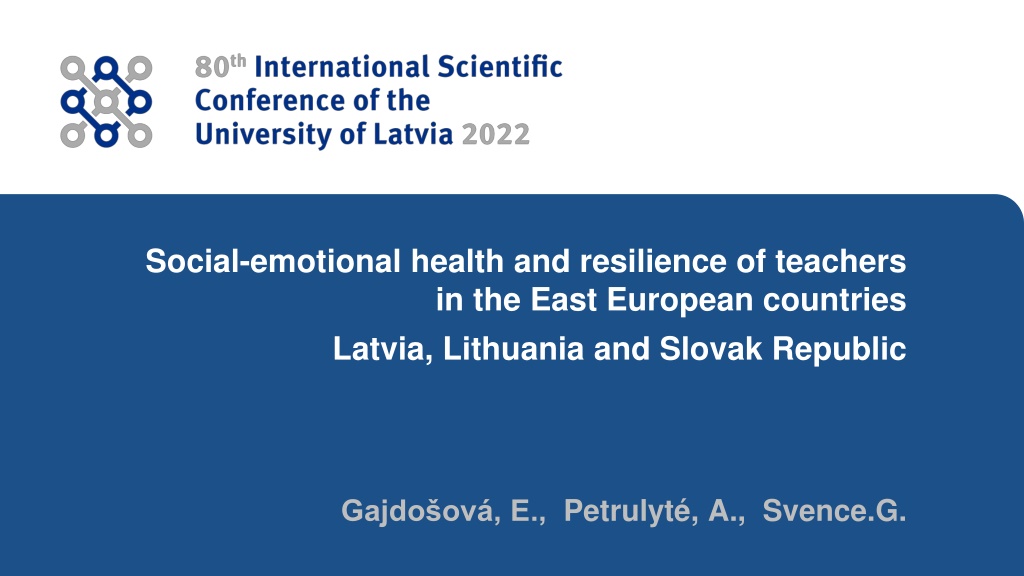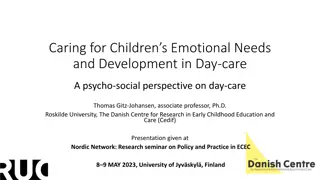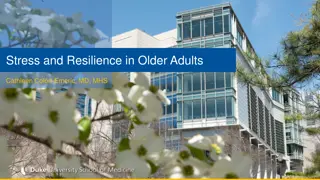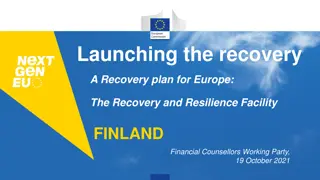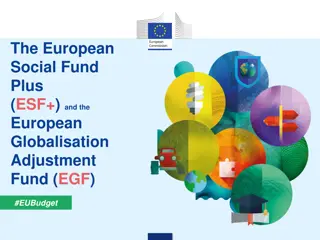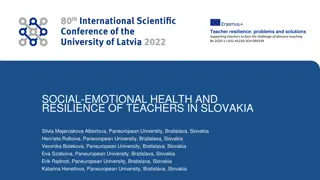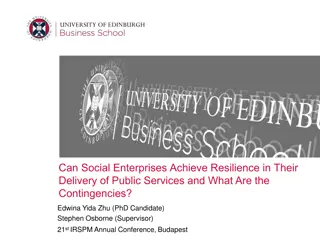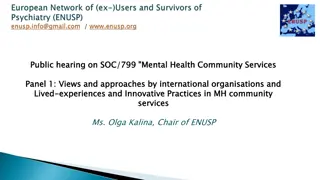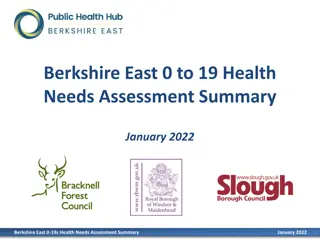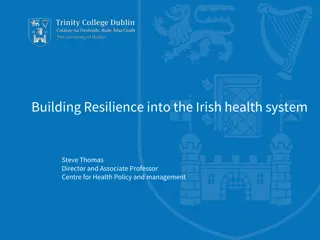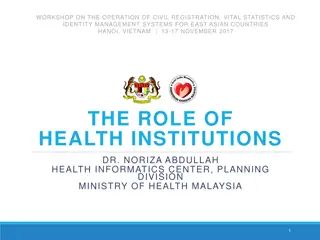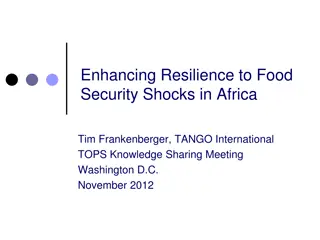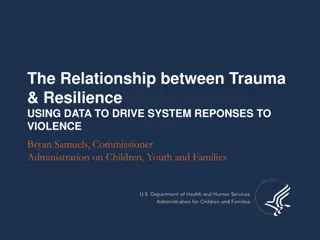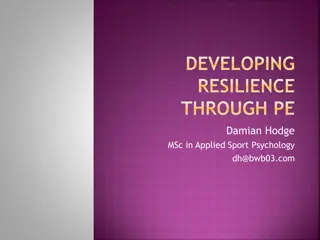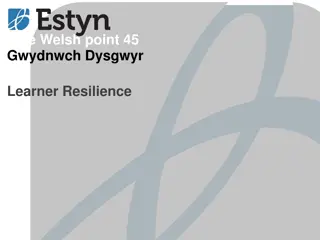Social-Emotional Health and Resilience of Teachers in East European Countries
This study explores the social-emotional health and resilience of teachers in Latvia, Lithuania, and the Slovak Republic as part of an Erasmus+ project aimed at developing a digital support system to promote their well-being. The interplay between mental health, social-emotional health, and resilience is crucial for teacher quality and overall education. The Social Emotional Health Model by Furlong identifies key positive indicators for mental health prediction, emphasizing domains such as belief in self and others, emotional competence, and engaged living. Resilience, as a personality trait, serves as a protective factor against stress and promotes adaptability and growth.
Download Presentation

Please find below an Image/Link to download the presentation.
The content on the website is provided AS IS for your information and personal use only. It may not be sold, licensed, or shared on other websites without obtaining consent from the author. Download presentation by click this link. If you encounter any issues during the download, it is possible that the publisher has removed the file from their server.
E N D
Presentation Transcript
Social-emotional health and resilience of teachers in the East European countries Latvia, Lithuania and Slovak Republic Gajdo ov , E., Petrulyt , A., Svence.G.
Erasmus+ project Three countries Latvia, Lithuania and Slovak Republic are participated in the Erasmus+ project Supporting teachers to face the challenge of distance teaching 2020-1-LV01-KA226-SCH-094599) during 2021 2023 The basic aim of the project is to develop a well-functioning digital support system for teachers promoting socio-emotional health and resilience. There is a lack of scientifically sound research methods and public teacher support programs targeting social and emotional health of educational professionals. It should also be mentioned that social and emotional health of teachers is directly related to positive quality of education (Fontana & Abouserie, 1993). 2
Mental health Mental health is an integral and essential component of health, one cannot exist without the other (Damodaran & Paul, 2016). According to World Health Organization (2004) health is a state of complete physical, mental and social well-being, not merely the absence of disease or infirmity. Mental health is more than the absence of mental disorders and it is closely connected to physical health (Kolappa et al., 2013). There is no health without mental health. It is a state of well-being, in which an individual realizes own abilities, is able to cope with stress in life, works productively and is capable to make contribution to the community (WHO, 2004). 5
Social-emotional health Social Emotional Health is a sum of positive social and emotional dispositions of a person and it is in line with the Dual-Factor mental health approach. The aim of the Social Emotional Health Model by Furlong is to identify key positive indicators for prediction of mental health (Furlong et al., 2014). It is based on positive psychology, consists of 4 positive main domains and 12 subscales as psychological indicators of mental headicators for prediction of mental health (Furlong et al., 2014). The Belief in self domain (BIS) consists of Self-Efficacy, Persistence and Self-Awareness. The Belief in Others domain (BIO) comprises Family Support, Institutional Support and Colleague Support. Emotional Competence (EC) consists of Cognitive Reappraisal, Empathy, Self-Regulation, and the last domain, Engaged Living (EL) includes Gratitude, Zest and Optimism. The overall Social Emotional Health is referred to as Covitality. 6
Resilience Resilience as a personality trait is a strength that acts as a significant moderator of negative effects of stress and a protective factor for adaption growth (Wagnild & Young, 1993). Resilience has also demonstrated potential to positively affect health, life satisfaction, quality of life and to prevent of the onset of depression (MacLeod et al., 2016). This may be considered a very important characteristic in teachers who in the present perform their profession in highly stressful and unfavorable circumstances in a relatively long-lasting pandemic period. 7
Research aim Primary research aim is to examine level of teacher s covitality, covitality domains and psychological indicators in the context of resilience in three East-European countries (Latvia, Lithuania, Slovakia) in the pandemic period which often have negatively affected mental health and coping in everyday life. 8
Research questions and objectives Based on the research aim, following research main questions were formulated: What is the overall level of social emotional health (SEHS-T) of teachers in Latvia, Lithuania and Slovakia? What is the level of teachers resilience in Latvia, Lithuania and Slovakia? How do the SEHS-T and RS dimensions and their correlations demonstrate a potential problem in the context of the socio-emotional health on a sample of teachers? We formulate the research objectives: To evaluate level of social-emotional health domains and indicators (SEHS-T) of teachers in Latvia, Lithuania, Slovak Republic and whole sample To evaluate teachers resilience (RS - 14) in Latvia, Lithuania, Slovak Republic and whole sample To identify correlations between SEHS-T and RS-14 of teachers sample. 9
2 Method 10
Participants The research sample includes 1200 participants teachers, 400 teachers from every participating country Latvia, Lithuania, Slovak Republic. Descriptive analysis shows, that 1054 (87. 8%) female teachers and 146 (12.2%) male teachers participated in the research. In Latvia there were 96.5% female teachers, in Lithuania 77.3% female teachers and in Slovak Republic 89.8% female teachers. 9 (6.6%) of teachers were 30 years old and younger, 242 (20.2%) teachers 31 40 years old, 389 (32.4%) teachers 41-50 years old, 366 (30.5%) teachers 51-60 years old and 124 (10.3%) teachers 61 years and older. The research sample confirmed the prevalence of female teachers and teachers older than 40 years in all 3 countries. 11
Methods Social-emotional Health Survey - Teachers (SEHS-T, Furlong & Gajdo ov , 2018) Social-emotional Health Survey-Teachers (SEHS-T; Furlong & Gajdo ov , 2018) is a modified version of the Social-Emotional Health Survey Higher Education (SEHS-HE; Furlong et al., 2017). It has been modified in some items with the agreement of its author Furlong for the assessment of teacher social-emotional health. SEHS-T reliability is high. The SEHS-T measures the covitality latent trait. Covitality refers to the co-occurrence of positive, healthy traits . It embodies the synergistic effects of positive mental health resulting from the interplay among multiple positive-psychological building blocks (Furlong et al. 2014a, p. 3). Social- Emotional Health Survey-Teachers SEHS-T assesses the level of covitality and its 4 domains Belief in Self (BIS) , Belief in Others (BIO), Emotional Competence (EC), Engaged Living (EL). SEHS-T has 12 subscales representing unique positive social-emotional health constructs associated with four general positive social-emotional health domains 12
Tab. 1 Cronbach s Alpha N statements Slovakia Latvia SEHS-T 48 0.930 0.890 BIS 12 0.813 0.870 BIO 12 0.818 0.820 EC 12 0.814 0.720 EL 12 0.845 0.770 13
Resilience Scale RS (Wagnild & Young, 1993, Wagnild, 2016) were used as measures for data collection. Resilience Scale (RS; Wagnild & Young, 1993, 2016) is a measure for assessment of individual resilience in two dimensions: personal competence and acceptance of self. It consists of 25 items which are rated on a Likert-type scale from 1-7. 14
3 Results 15
Social-emotional health of teachers The level od social-emotional health of teachers form East European countries is high (M=230.34). The highest score of social-emotional health was found for Slovak Republic teachers (M=238.65), teachers from Lithuania (M= 230.51) and Latvia (M= 221.54) scores slightly lowed . There is significance of differences among countries, with medium eta squared/effect size (p 0,001, 2= .09). Based on the results of post-hoc analysis significant differences were found between individual countries (Latvia Lithuania, Latvia Slovak Republic, Lithuania Slovak Republic). 16
Social-emocional health domains Belief-in-self (BIS) BIS in teachers in participating countries is at high level (M=57.11). The highest level was found in Slovak Republic teachers (M=59.65), only slightly lower level of BIS was found in Lithuania teachers (M=58.53) and lower level, however still in the high range, was found in Latvia teachers (M=53.16) Differences in BIS in the three participating countries are statistically significant (p 0,001, 2= .16). Belief in-others Differences in Belief-in-others (BIO) among the countries are statistically significant with medium effect size (p 0,001, 2= .07). The average overall score in BIO is the lowest compared to other covitality domains (M=56.83). 18
Emotional Competence (EC) Level of EC in participating countries was found to be high (M= 58.71). Out of all covitality domains this is the domain where the teachers scored the highest. Differences among the countries in the domain EC are statistically significant (p 0,001, 2= .06). Engaged Living (EL) The average score in the domain EL is M=57.59 the high level Differences between the countries are statistically significant (p= .001, 2= .04). 19
Psychological indicators of covitality Several psychological indicators in SEHS-T, self-efficacy, cognitive reppraisal, empathy, selfregulation, gratitude, optimism, were found to be at high level ( >18) in participating countries. However other covitality indicators that were at overall high level, reached only moderate level in individual countries. These are: persistance (Latvia M=17.00), self-awareness (Latvia M=17.84), institutional support (Lithuania M=17.46, Slovakia M=18,11), colleague support (Lithuania M=17.88), zest (Slovakia M=17.68). 20
Frequency analysis Frequency analysis of SEHS-T and responses of teachers in involved countries provided interesting results. The weaknesses in relation with the social-emotional health of teachers are: Belief in Others (BIO): (institutional support, colleague support) and Engaged Living (EL): gratitude and zest. The positive strengths in relation with the mental health of teachers are: Competence (EC): self-regulation, cognitive reappraisal, empathy. Emotional 21
Resilience of teachers Results confirmed that participants scored at moderate level in resilience (M=76.30). Lithuanian (M=72.93), Latvian (M=75.04) and Slovak (M=80.92) teachers reported only moderate level of resilience. There are however significant differences in resilience among the countries (p 0,001, 2= .10). Limits were identified in the extent of energy and enthusiasm for requested activities 22
Corellations between teachers resilience and covitality Significant positive correlation were found between teachers resilience and covitality (rs= ,.679**, p=,000) as well as resilience and four covitality domains (BIS rs= .579**, BIO rs= .528, EC rs= .580**, EL rs= .615**). Results indicate that especially Emotional Competence (EC) and Engaged Living (EL) are associated with resilience. Correlations between resilience and 12 social-emotional indicators (subscales) are between rs= .542** to rs= .400**. between resilience and zest (rs= .542**) and optimism (rs= resilience and self-efficacy (rs= ,539**) and self-awareness (rs= 503**). Strong positive correlation was found , 528**), as well as between 24
4 Discussion 25
Discussion In pandemic period the mental health of population starts to be of significant focus of European, state and government authorities. Mental health with an emphasis on the social-emotional health of students and teachers at schools becomes of particular interest. Only teachers with good mental health can support and improve mental health of their students in every type of school. The international research in the East-European countries Latvia, Lithuania and Slovakia has confirmed that the level of socio-emotional health of teachers is high, both overall and in its key domains. The overall resilience of teachers was found to be on moderate level, the same applied to individual resilience dimensions. 26
Discussion Results from the present study indicate significant correlations betveen covitality and resilience in the participating sample and are thus in line with previous research (Furlong, 2013, Boman et al., 2017, Telef & Furlong, 2017). Moreover, significant associations were confirmed for covitality and engaged living, emotional competence, as well as psychological indicators of self-efficacy, self- awareness, empathy, zest and optimism. The study showed preliminary good psychometric characteristics of the used tools, which allow us to use these tools in project second phase . 27
Theoretical and practical implications The project is just at a starting point of a set of activities to equip education and training systems to face the challenges presented by the recent sudden shift to online and distance learning. The project consortium will develop a system whose further functioning after the project and the project partner universities will maintain EU funding as part of their everyday work. 28
Thank you for your attention!
